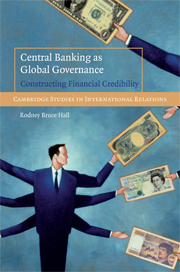Book contents
- Frontmatter
- Contents
- Preface
- 1 Central banking as governance
- 2 The social character of money
- 3 Instituting facts and constituting rules
- 4 Constitutive power relations
- 5 Rules and international monetary systems
- 6 Central bank independence as credibility
- 7 Transparency and intersubjectivity in central banking
- Bibliography
- Index
- Cambridge Studies in International Relations
- References
6 - Central bank independence as credibility
Published online by Cambridge University Press: 03 May 2010
- Frontmatter
- Contents
- Preface
- 1 Central banking as governance
- 2 The social character of money
- 3 Instituting facts and constituting rules
- 4 Constitutive power relations
- 5 Rules and international monetary systems
- 6 Central bank independence as credibility
- 7 Transparency and intersubjectivity in central banking
- Bibliography
- Index
- Cambridge Studies in International Relations
- References
Summary
Not all Germans believe in God, but all believe in the Bundesbank.
Jacques DelorsYou know, Bill, I'm having my gallbladder out. You wouldn't do it [raise interest rates] while I'm having my gallbladder out, would you?
Lyndon Baines Johnson to William McChesney Martin…the worst episodes in monetary history – the great inflations – have been marked by the subjection of central bankers to overriding political pressures.
R. S. SayersSubsequent to the demise of the classical gold standard, the debate over rules-based vs. discretionary monetary systems can be traced back at least as far as the inter-war period to a famous essay by one of the leading liberal lights of the Chicago School of economics. In an exposition that appears curious to contemporary eyes, Henry Simons argued passionately for a rule-based system to defend democracy and capitalism against what he regarded to be the “immanent danger” that democratic free enterprise would be subverted and lost by “delegation of legislative powers and the setting-up of authorities instead of rules.”
I will employ Simons's oft-cited essay as an early exploration of the continuing debate within monetary economics between “rules” and “discretion” in monetary policy. This debate exemplifies some of the liberal commitments that still shape the debate, and have resulted in a turn toward central bank independence and transparency strategies as the means to recapture the price stability and credibility of the classical gold standard, while retaining the benefits of “discretion,” at least a form of contingency.
- Type
- Chapter
- Information
- Central Banking as Global GovernanceConstructing Financial Credibility, pp. 153 - 188Publisher: Cambridge University PressPrint publication year: 2008
References
- 2
- Cited by



